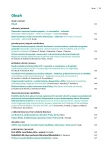-
Medical journals
- Career
Vitamin D – old substance in new perspectives
Authors: Vladimír Kojecký
Authors‘ workplace: Interní klinika, Krajská nemocnice T. Bati, a. s., Zlín, přednosta MUDr. Jiří Latta
Published in: Vnitř Lék 2015; 61(7-8): 695-697
Category: Vanýsek´s day 2015
Overview
Receptors for vitamin D are present almost in all body tissues. Vitamin D does not only act as a regulator of calcium and phosphorus metabolism, but also a substance which modulates the immunity system function, regulates cell proliferation. Genetic, epidemiological and experimental data indicate a possible role of vitamin D deficiency in the development of some diseases, mainly of autoimmune diseases and tumours. The benefit of curative intake of vitamin D has so far not been proven. There is no reason why the deficiency of vitamin D should not be covered. The substitution should start with the replenishment of the lacking amount of vitamin D (which may even be several hundred thousand units) and involve ongoing intake of the recommended substitution dose of 800–1 000 vitamin D units per day.
Key words:
autoimmune disease – vitamin D – intestinal inflammation
Sources
1. Krista M, Reich KM, Fedorak RM et al. Vitamin D improves inflammatory bowel disease outcomes: Basic science and clinical review. World J Gastroenterol 2014; 20(17): 4934–4947.
2. Yasmin R, Williams RM, Xu M et al. Nuclear import of the retinoid X receptor, the vitamin D receptor, and their mutual heterodimer. J Biol Chem 2005; 280(48): 40152–40160.
3. Khalili H, Huang ES, Ananthakrishnan AN et al. Geographical variation and incidence of inflammatory bowel disease among US women. Gut 2012; 61(12): 1686–1692.
4. Cantorna MT, Zhu Y, Froicu M et al. Vitamin D status, 1,25-dihydroxyvitamin D3, and the imune system. Am J Clin Nutr 2004; 80(6 Suppl): S1717-S1720.
5. Ananthakrishnan AN, Khalili H, Higuchi LM et al. Higher predicted vitamin D status is associated with reduced risk of Crohn’s disease. Gastroenterology 2012; 142(3): 482–489.
6. Ananthakrishnan AN, Cagan A, Gainer VS et al. Normalization of plasma 25-hydroxy vitamin D is associated with reduced risk of surgery in Crohn’s disease. Inflamm Bowel Dis 2013; 19(9): 1921–1927.
7. van der Mei IA, Ponsonby AL, Dwyer T et al. Past exposure to sun, skin phenotype, and risk of multiple sclerosis: case-control study. BMJ 2003; 327 (7410): 316–321.
8. Martineau AR, Mac Laughlin BD, Hooper RL et al. Double-blind randomised placebo-controlled trial of bolus-dose vitamin D3 supplementation in adults with asthma (ViDiAs). Thorax 2015; 70(5):451–457. Dostupné z DOI: <http://dx.doi.org/10.1136/thoraxjnl-2014–206449>.
9. Chen EQ, Shi Y, Tang H. New insight of vitamin D in chronic liver diseases. Hepatobiliary Pancreat Dis Int 2014; 13(6): 580–585.
10. Giovannucci E. The epidemiology of vitamin D and cancer incidence and mortality: a review (United States). Cancer Causes Control 2005; 16(2): 83–95.
11. Wactawski-Wende J, Kotchen JM, Anderson GL et al. Calcium plus vitamin D supplementation and the risk of colorectal cancer. N Engl J Med 2006; 354(7): 684–696.
12. Avenell A, MacLennan GS, Jenkinson DJ et al. Long-term follow-up for mortality and cancer in a randomized placebo-controlled trial of vitamin D(3) and/or calcium (RECORD trial). J Clin Endocrinol Metab 2012; 97(2): 614–622.
13. van Groningen L, Opdenoordt S, van Sorge A et al. Cholecalciferol loading dose guideline for vitamin D-deficient adults. Eur J Endocrinol 2010; 162(4): 805–811.
Labels
Diabetology Endocrinology Internal medicine
Article was published inInternal Medicine

2015 Issue 7-8-
All articles in this issue
- Pancreas transplantation: State of the art and future prospects
- Tumours and liver transplants
- Solid organ transplantation in the Czech Republic
- Cannabis – therapy for the future?
- New trends in treatment of non-variceal bleeding in the upper gastrointestinal tract
- Home nutrition care in the Czech Republic
- Vitamin D – old substance in new perspectives
- Possible endoscopic solutions of polypoid and non-polypoid lesions in the colon
- Ordinary disease – appendicitis
- Platí „LDL-hypotéza“ i pro pacienty s diabetem?
- Lowering of blood pressure – by treatment of other risk factors
- How to treat dyslipidemia in patients with metabolic syndrome
- AB0 incompatible kidney transplantation – first experiences
- Takotsubo cardiomyopathy – what has changed – editorial
- Risk factors of thyroid carcinoma – editorial
- Takotsubo cardiomyopathy, clinical experience with the disease and one-year prognosis of patients
- Rituximab infusion-related toxicity in patients with chronic lymphocytic leukemia
- Cardiovascular effects of GLP-1 receptor agonist treatment: focus on liraglutide
- Transcatheter aortic valve implantation – diagnostic, procedure and outcomes
- Hepatorenal syndrome – pathophysiology, diagnosis and treatment
- Risk factors of thyroid carcinoma
-
Erectile dysfunction as the first sign of systemic vascular diseases and of organovascular arterial ischemic diseases.
Guidelines and Challenge of the Angiology section of Slovak Medical Chamber (AS SMC, 2015)
- Internal Medicine
- Journal archive
- Current issue
- Online only
- About the journal
Most read in this issue- Ordinary disease – appendicitis
- Transcatheter aortic valve implantation – diagnostic, procedure and outcomes
- Hepatorenal syndrome – pathophysiology, diagnosis and treatment
-
Erectile dysfunction as the first sign of systemic vascular diseases and of organovascular arterial ischemic diseases.
Guidelines and Challenge of the Angiology section of Slovak Medical Chamber (AS SMC, 2015)
Login#ADS_BOTTOM_SCRIPTS#Forgotten passwordEnter the email address that you registered with. We will send you instructions on how to set a new password.
- Career

